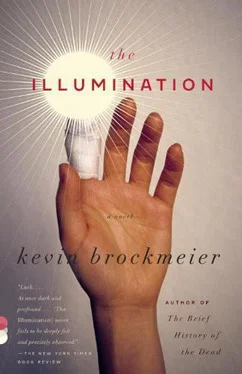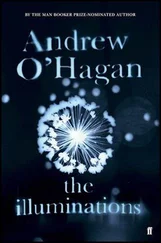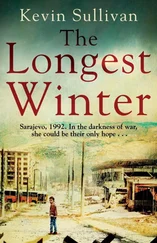So it was that Morse made up his mind one day to pay a visit to the camps. He went to the bus station and stowed his shopping cart in one of the large roll-in storage lockers across the lobby from the ticket counter, then caught the northbound train from the platform across the street. He got off at the third stop after the river, hiking past strip malls and used-car dealerships until he reached the warehouse with the painting of the American flag on its side, where he slipped through the rent mesh of a chain-link fence and cut through the tree line to the freeway. The culvert was dry, so he followed it under the road, then scaled the bluff that looked down over the traffic. Sometimes, during rush hour, he would sit on the bare mass of marble at the top and watch the cars and trucks streaming by. Every so often a squirrel or a possum would dart out of the woods and vanish into the chaos of wheels, reappearing as a flash of golden light that popped open and scattered across the concrete.
The camps were a quarter-mile into the trees. Morse walked through tussocks of yellow grass and over the slanting roofs of half-buried stones, then past a rickety wire coop where a line of chickens sat meditating eggs. Suddenly a clearing opened up, and there it all stood: the lawn chairs and the clotheslines, the circles of charred dirt, the clumps of nylon tents that seemed to bloat out of the ground like sheeny orange mushrooms. A stop sign had been nailed to the trunk of a white oak and along the bottom someone had spray-painted the word TIBET. Toward the back of the clearing was a pile of trash, filled with all the waste pieces and bits of metal the camp’s countless fires had not succeeded in consuming—beer cans with their labels whitened away, clothes hangers straightened into antennas, the spoonlike keel bones of chickens. And to the west, beneath the arms of an ancient chestnut, was a canvas tarp with a soft glow leaking from inside.
Something drew Morse toward the light. He found a dozen men sitting hunched on crates and logs around a gas lantern. Their bodies seemed to whisk around inside themselves. Tucker was the one with the eczema scales on his face and the respiratory ache in his chest, the cramps in his stomach and the chilblains on his feet, and God only knew what terrible baroque infection casting its glow from the beds of his fingernails. His body had become a horror novel: The Fall of the House of Tucker . He couldn’t remember the last time he truly felt like himself, the last time he sensed that old strength of spirit pulsing inside him. When he was thirteen or fourteen, probably, around the time he met Jeff Moody and that crowd and his parents tossed him out for huffing paint and breaking into storage units. Those were the days. All that ravaged holiness. Things had never been better. Show me a person who rambles on and on about his childhood and I’ll show you a person whose life has disappointed him. Tucker watched a praying mantis take a few stiltlike steps across the ceiling of the tarp. Praying, preying, praying, preying. Praying, he decided. It seemed to be moving in slow motion. He put his knuckles to his eyes and rubbed them. The hissing sound surprised him. Then he looked up and realized it was just the lantern, venting propane into its chamber. The one letting the matchstick bob between his teeth had turned up the burner. His name was Aaron, and he’d be damned if he went back to the shelters, where they tried to steal your backpack while you were sleeping, except you weren’t sleeping at all, were you? No, no, you were pulling the old fluttery eyelash trick, and when you bounded up from the mattress to bust some skulls, they nailed you from your weak side with a twelve-inch Maglite. So what if the volunteers gave you a hot meal and let you use the showers? So what? The place was full of crooks, perverts, and evangelicals—f-a-c-t fact . Him, he would rather be safe and freezing on a pallet of oak leaves, lying where he could stare out of his own sleeping bag, and not at the walls or rafters but the sky, watching the birds light up the trees with their own little infections and heart attacks. He held his hands out toward the Coleman lantern. His fingertips seemed to waver in the fumes. What was with everyone? A silence had fallen over the group, a heavy quilt of exhaustion. Screw that shit. Time to liven things up with his favorite joke. “Hey, fellas,” he said, and he nodded across the circle. “Why does David here smell so bad?” David. That was the one whose hair was receding in a perfect arc, like the gently spreading ripple on the surface of a pond after a goldfish lips at a mayfly. Her real name, though, was Kristi, and she had known it ever since she was a little boy, gazing at herself in the mirror as she tucked her penis between her legs. That wonderful tightening of the skin. That glorious nectarine smoothness. She should have paid for the operation fifteen years ago with her student loan money, just like she had threatened she would. Whose body was it, after all? I mean, really, Mom—whose? A bent green insect dropped onto the lantern, casting its giant shadow onto the tarp. In a million years Kristi could never explain why it startled her into beating Aaron to the punch line, but it did. “So that blind people can hate me, too,” she said. Everyone laughed. The joke never changed. Oh what a riot. What a fucking, fucking riot. How dismal it was to wake up every morning as the same gamy, balding mammoth of a man she had been when she went to sleep. Oh to wake up one morning as what she truly was—a gamy, balding mammoth of a woman . Hah! Now that really was funny. Good one, Kristi.
Morse picked up an orange crate and edged his way into the circle. Reluctantly the others made room for him. He had just settled down when the one with the smudge of oil on her glasses asked, “Say, man, you got a cigarette?”
“A cigarette?” Morse made a show of checking his pockets. “No cigarette.”
“ Pfft . What makes you think you’re welcome here without any cigarettes? I don’t even know you. Does anyone else here know this joker?”
“I don’t know him.”
“Never seen him before.”
“Yeah, that’s what I figured. You got a light, at least?”
“No, no, got no light.”
“Then here’s a question: what exactly are you good for?”
“Good. Good. Good. Good.” Morse took a breath. “Good question.”
Accidentally he had delivered a wisecrack. That, it seemed, was all it took—he had established his credentials. He was the squirrelly guy, the comedian, quiet but sort of funny if you gave him half a chance, and nobody would object if he sat with them around the lantern, watching as they held their fingers to the heat or drank from a bottle of liquor, smoked a joint or played high-card-low-card. The one suffering from the trembling disease that caused a hard light to glare from his body invited Morse to join the game, but he declined with a shake of his head. The one who had been chewing on the matchstick touched it to the burner, watching it ignite with a fizz of sulfur. The one with the dragonfly tattoo squeezed the knee of the one whose long black hair fell almost to her waist, and she closed her eyes and passed him a slow, stretching, easy-baked smile. Morse had the impulse to squeeze her other knee, that fat little beanbag he saw marking its shape in her skirt, but he knew better than to try it. All the goodwill he had earned would evaporate in an instant if he did. The sun was nearly gone. It was only a few seconds before the last moment of left light came angling over the field and disappeared.
An hour or so later, shortly after the one with the broken veins on his cheeks snuffed out the lantern, Morse dragged a sheet of cardboard to the border of the clearing and lay down. For warmth he brought his legs together and pulled his arms inside his clothing. As usual, he found himself tracing his scars with his fingers. His wounds had healed long ago, forming raised white lines that remained stiff and pale no matter how flushed he became. He was fascinated by them, by their singular alien braille. They still hurt when he prodded them, not unbearably, not even unpleasantly, but enough. Enough so that he noticed. Enough so that his awareness yielded itself over to them and whatever else he had been thinking about gradually gave way and drifted out of his mind. He had learned to love them, those firm embossments of stitched skin. They gave him the same feeling of comfort he imagined devout Catholics must experience fingering the beads of a rosary.
Читать дальше












